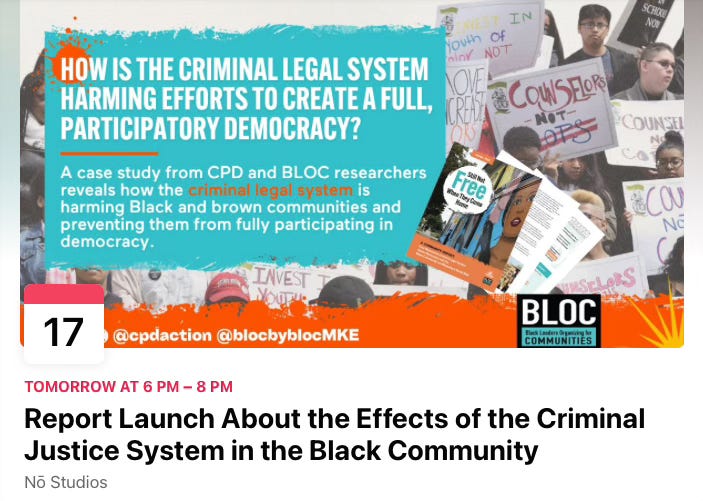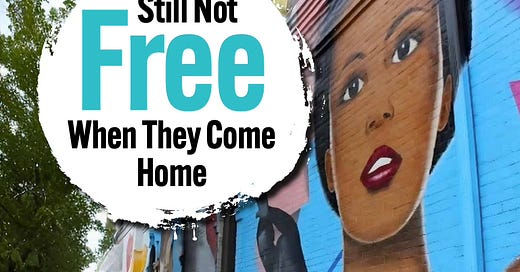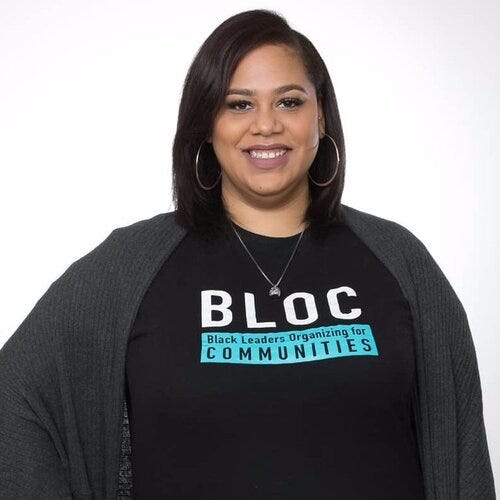How trauma and the criminal justice system create barriers to democracy in Wisconsin
BLOC and the Center for Popular Democracy are releasing a comprehensive new report: "Still Not Free When They Come Home."
The Recombobulation Area is a ten-time Milwaukee Press Club award-winning weekly opinion column and online publication. Learn more about it here.
Guest column by Angela Lang, executive director of Black Leaders Organizing for Communities (BLOC).
Milwaukee ZIP code 53206 is the most incarcerated in Wisconsin. It is also more than 90% African American. In many ways, people see 53206 as ground zero for so many challenges in our community.
Mass incarceration intersects with so many other issues. Lack of economic opportunity or safe affordable housing can lead to people being in survival mode, feeling that the cycle of poverty is impossible to escape.
This week, after roughly a year of research, BLOC is releasing a report on the impacts of the criminal justice system on our community. You can see the full report here. Our organization often sits at the intersection of mass incarceration and democracy.
As a year-round civic engagement organization with an office in 53206, we see how these two issues go hand in hand. Some of our Ambassadors — think year-round canvasser on steroids — don’t have their voting rights restored but still educate our community day in and day out.
We talk openly in the office about the criminal justice system and its various impacts on our personal lives, whether it’s day-to-day police harassment or being held in jail for a crime you didn’t commit. Despite how resiliently we may carry them, all of these stories are traumatic. When day-to-day police harassment is the norm in your life, you might not feel a thing like voting will actually change your life or be worth the energy.
We wanted to help tell the stories we’ve heard over the years. A team of Ambassadors conducted interviews asking people of their experiences in the criminal justice system and how it impacts their lives today. A constant theme? Trauma.

We’re living in drastic times. A lot of people are just looking to survive, one day at a time. While there are more obvious forms of voter suppression — like getting rid of absentee dropbox locations or threatening to close down the Midtown polling place — we can’t ignore the other barriers to democracy for us.
During Get Out The Vote in 2014, I knocked on the door of a woman who I was trying to persuade to vote in the gubernatorial election that coming Tuesday. It was a young organizer’s dream door. She hadn’t fully committed to voting, but after a brief discussion about the issues she cared about, she was excited to vote. When it is that close to an election, we always make sure to ask folks their voting plan. Do you plan on voting before work? After you pick up the kids? It helps to have them envision their day; it makes it a little more real. She said “Oh this Tuesday?” and handed the literature back to me. She mentioned she had to work, was riding the bus, had a night class, and was a single mother. She was excited to vote, but other structural barriers prevented her from casting a ballot. I remember this being the first time thinking of voter suppression outside of the traditional definitions and what we are used to seeing.
Add in, then, the trauma that can come from the criminal justice system. These too are barriers to democracy. When someone is caught in the criminal justice system, other family members take on added responsibility to make ends meet. Students who lost a parent may be distracted in school —where is the time to be civically engaged? And why should you bother to be civically engaged when your elected officials either do not act at all or vote for policies that harm your community? You wonder who is fighting for you and wonder why bother showing up?
The pandemic brought about additional challenges, like the ability to see your loved one who is serving time. Relationships can be strained because jail visits were halted, adding yet another layer of trauma.
Imagine completing your sentence and then struggling to get a job or housing because of your criminal background. You scrape by with odd jobs and stay with friends or family who are now distant because you haven’t spoken to them in years. Groceries and gas are expensive and the federal minimum wage hasn’t moved in 14 years. This is the reality of many. When election season rolls around, we are told campaign promises to change those conditions, few of which are actually acted upon. And the cycle continues. These challenges make it difficult to build political power when your basic needs aren’t met.
What some don’t realize is that your voting rights are restored when you’re off supervision. Many people have expressed that when they are on supervision, it is made very clear that they cannot vote. But when they are off supervision, those rights are restored quietly– so quietly, that people don’t always know their voting rights have been restored.
In 2012, to further frighten people and foment uncertainty, billboards went up on the North side of Milwaukee that said “Voter Fraud Is A Felony.” There was immediate backlash as some people who had their voting rights restored wondered if they actually could legally vote. Some who remember those billboards may not be voting because the scare tactic worked. So many times our team will be knocking on doors and it will be our Ambassadors who are the ones to tell people that their voting rights are restored if they are off supervision.
When you disproportionately incarcerate Black folks, you take away their ability to vote and participate in democracy. When folks reenter back to their daily lives, they work hard to meet their basic needs. Sprinkle in voter suppression and scare tactics and you have a recipe for preventing a whole community from being able to build power.
Voter suppression is more than just cutting early voting sites or changing residency requirements. Mass incarceration exacerbates other systemic barriers to democracy. At BLOC, we believe things like housing, a livable wage, and health care are democracy issues. If your basic needs aren’t being met, it is hard to keep up with the ever-changing political landscape. Participating in civics can feel like a luxury. How privileged it is to have extra time that isn’t dedicated to rebuilding your life after the criminal justice system took it away from you.
“Black people can’t just simply show up and participate in democracy, we always have to fight for it. When you’re fighting day in and day out, sometimes there isn’t that fight left in you to now have to fight for your right to vote — a right you already have.”
If you are reading this, I’m assuming you follow politics and are fairly knowledgeable on current political events. When you’re working multiple jobs, taking time off to travel hours to see incarcerated loved ones, navigating unstable housing —which you need to keep a job, and you need to keep a job to stay out of jail — there isn’t always time left to engage with a system you have to fight in.
Black people can’t just simply show up and participate in democracy, we always have to fight for it. When you’re fighting day in and day out, sometimes there isn’t that fight left in you to now have to fight for your right to vote — a right you already have. Showing up on Election Day isn’t always so simple for us. We are not a monolith, and this isn’t the story of every Black person, but it's the stories of so many that go unnoticed.
During the year, we sometimes hear about the voter suppression efforts led by Republicans. After an election, we might find that one ward, or one pocket where Black voter turnout went down, and we ask ourselves: why? We should be marrying these two stories. Just last November, we heard reports of folks showing up to the wrong polling place due to redistricting changes. If those folks were hourly workers, and were riding the bus, they may not have been able to have time to go to their updated polling place. These are just a few issues that we see also impacting our ability to fully participate in democracy.
All of these issues have a layer of trauma that comes with them. Imagine trying to survive day to day and climb all of these hurdles while navigating the ways your trauma manifests. When you’re trying to survive and get your life back from being trapped in the system, imagine folks looking you in the eye while they promise your life will get better if you just show up and vote for them.
For some, it’s not so simple.
Angela Lang is the executive director of Black Leaders Organizing for Communities (BLOC). She was born and raised in the heart of Milwaukee. She has an extensive background in community organizing. In the past, Angela served as both an organizer and State Council Director for the Service Employees International Union, working on such campaigns as the Fight for 15. Before joining BLOC, Angela was the Political Director with For Our Future Wisconsin. She is a graduate of Emerge Wisconsin and has had the pleasure of being the featured trainer for Emerge's Diversity Weekend since 2015.
Subscribe to The Recombobulation newsletter here and follow us on Facebook and Instagram at @therecombobulationarea.
Already subscribe? Get a gift subscription for a friend!







All well said. The system isn't broken. It is working exactly as intended. Thanks for work, Angela and BLOC!